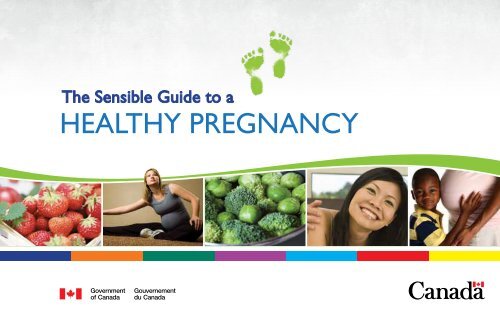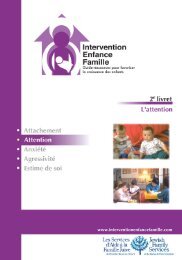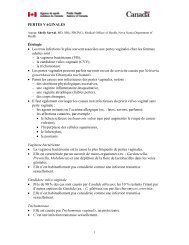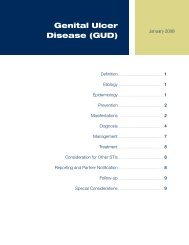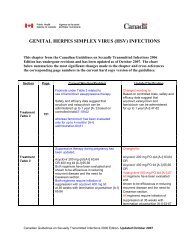The Sensible Guide To A HEALTHY PREGNANCY
The Sensible Guide To A HEALTHY PREGNANCY
The Sensible Guide To A HEALTHY PREGNANCY
You also want an ePaper? Increase the reach of your titles
YUMPU automatically turns print PDFs into web optimized ePapers that Google loves.
<strong>The</strong> <strong>Sensible</strong> <strong>Guide</strong> to a<br />
<strong>HEALTHY</strong> <strong>PREGNANCY</strong>
<strong>To</strong> promote and protect the health of Canadians through leadership, partnership, innovation and action in public health.<br />
—Public Health Agency of Canada<br />
Published by authority of the Minister of Health.<br />
<strong>The</strong> <strong>Sensible</strong> <strong>Guide</strong> to a Healthy Pregnancy is available online at:<br />
www.healthycanadians.ca/pregnancy<br />
Également disponible en français sous le titre : Le guide pratique d’une grossesse en santé<br />
This publication can be made available in alternative formats upon request.<br />
For further information or to obtain<br />
additional copies, please contact:<br />
1 800 O-Canada (1-800-622-6232)<br />
TTY: 1-800-926-9105<br />
Public Health Agency of Canada<br />
Ottawa, Ontario K1A 0K9<br />
© Her Majesty the Queen in Right of Canada, represented by the Minister of Health, 2008. Revised in 2011<br />
HC Pub.: 5830 Cat.: HP5-33/2011E ISBN: 978-1-100-11672-3
<strong>The</strong> Healthy Pregnancy <strong>Guide</strong><br />
If you are pregnant, or are planning to become pregnant, this guide is for you!<br />
Having a baby can be a wonderful experience, but it can also be a time of uncertainty. Many women have<br />
questions and concerns as they face all the changes that pregnancy brings. But with advice coming from<br />
everyone, it’s tough to know who to listen to. That’s why having the accurate information is so important! It will<br />
help you to make good decisions about how to take care of yourself before, during and after your pregnancy.<br />
At the beginning of the guide, you will find important facts and questions related to a healthy pregnancy. <strong>The</strong>y include:<br />
Prenatal Nutrition .......................................................... 2<br />
Folic Acid .......................................................................... 6<br />
Alcohol and Pregnancy .................................................. 9<br />
Physical Activity and Pregnancy .................................12<br />
Smoking and Pregnancy .............................................16<br />
Oral Health ...................................................................20<br />
Emotional Health .........................................................24<br />
<strong>The</strong> second half of the guide has a handy 10-month pregnancy calendar that you can personalize to help you keep track<br />
of what week of pregnancy you are in. Each month includes interesting facts, useful information and tips on a variety of<br />
pregnancy-related topics.<br />
Planning a pregnancy and being pregnant are exciting times in your life! Using this guide can help make it a healthier<br />
experience for you and your baby.<br />
1
Prenatal Nutrition<br />
Healthy eating plays a very important role in a healthy pregnancy. You need to eat foods from a variety<br />
of sources to make sure you get all the vitamins, minerals and nutrients you and your developing baby<br />
need. Eating well will also help you feel better, give you more energy and help keep your weight in check.<br />
It will also contribute to your baby’s healthy growth and development.<br />
IMPORTANT FACTS<br />
Know what you need<br />
During your second and third trimesters of pregnancy, you need<br />
more calories each day to support the growth of your baby.<br />
For most women, this means an extra two or three Food <strong>Guide</strong><br />
servings daily. You can add them in as an additional snack or as<br />
part of your usual meals. For example, have a fruit and yogurt as<br />
a snack, or have an extra slice of toast at breakfast and an extra<br />
glass of milk at supper.<br />
Government of Canada | <strong>The</strong> <strong>Sensible</strong> <strong>Guide</strong> to a Healthy Pregnancy 2 Prenatal Nutrition
Fruits and vegetables are a must!<br />
Pregnant women need fruits and vegetables every day.<br />
Brightly coloured vegetables and fruit contain more of the<br />
kinds of vitamins you and your baby need. You should eat at<br />
least one dark green and one orange vegetable each day.<br />
Make sure your fruits and vegetables are prepared with little<br />
or no added fat, sugar and salt, and choose vegetables and<br />
fruit more often than juice.<br />
Grain products are important<br />
You need to include grain products as part of your daily diet.<br />
This includes foods like bread, rice and pasta. Try to choose<br />
grain products that are lower in fat, sugar and salt, and look<br />
for the “whole grain” variety since at least half of your daily<br />
grain intake should be whole grain.<br />
Government of Canada | <strong>The</strong> <strong>Sensible</strong> <strong>Guide</strong> to a Healthy Pregnancy 3<br />
Have milk and milk alternatives for strong bones<br />
Milk and alternatives are important for your growing baby.<br />
Opt for the low-fat variety, which will give you the high quality<br />
protein, calcium and vitamin D you need but with less of the<br />
fat and calories. Have skim, 1% or 2% milk every day and<br />
go for a variety of yogurt and cheese. Drink fortified soy<br />
beverages if you do not drink milk.<br />
Include meat and meat alternatives<br />
Eating meat and alternatives each day will help you and your<br />
baby stay healthy. Choose lean (less fatty) meats and meat<br />
alternatives—dried peas, beans, tofu and lentils—made with<br />
little or no added fat or salt. Fish is also important and should<br />
be eaten each week. But choosing which fish to eat, and how<br />
much, can be complicated.<br />
Prenatal Nutrition
Visit Health Canada’s Web site to find out how to choose<br />
fish that are low in mercury so that you and your baby can<br />
take advantage of the benefits of eating fish while minimizing<br />
the risks from mercury.<br />
Next Steps<br />
Aim for three meals a day with<br />
healthy snacks in between.<br />
Check out Canada’s Food <strong>Guide</strong> to<br />
see how many servings of each food<br />
group you need each day.<br />
Take a multivitamin every day.<br />
Make sure it has 0.4 mg of folic acid<br />
and also contains iron. A health<br />
care provider can help you find the<br />
multivitamin that is right for you.<br />
Government of Canada | <strong>The</strong> <strong>Sensible</strong> <strong>Guide</strong> to a Healthy Pregnancy 4 Prenatal Nutrition<br />
COMMON QUESTIONS ABOUT<br />
PRENATAL NUTRITION<br />
How much weight should I gain while<br />
I’m pregnant?<br />
It depends on how much you weighed before you got<br />
pregnant. <strong>The</strong> following recommendations are based on<br />
your Body Mass Index (BMI) before you became pregnant.<br />
BMI is a number based on a comparison of your weight to<br />
your height (BMI = weight (kg)/height (m) 2 ).<br />
BMI Recommended Weight Gain<br />
Below 18.5 12.5 to 18 kg (28 to 40 pounds)<br />
Between 18.5 and 24.9 11.5 to 16 kg (25 to 35 pounds)<br />
Between 25.0 and 29.9 7 to 11.5 kg (15 to 25 pounds)<br />
Over 30 5 to 9 kg (11 to 20 pounds)<br />
If you are pregnant with more than one baby (twins, triplets)<br />
you will need to gain more weight. Your health care provider<br />
will be able to advise you.
Is there anything I shouldn’t eat while<br />
I’m pregnant?<br />
Yes. Avoid the following foods which may be contaminated<br />
by bacteria:<br />
Raw fish, especially shellfish such as oysters and clams<br />
Undercooked meat, poultry and seafood<br />
(for example, hot dogs, non-dried delimeats,<br />
refrigerated pâté, meat spreads and<br />
refrigerated smoked seafood and fish)<br />
All foods made with raw or lightly<br />
cooked eggs (for example, homemade<br />
Caesar vinaigrette)<br />
Unpasteurized milk products and<br />
foods made from them, including soft<br />
and semi-soft cheeses such as Brie or<br />
Camembert<br />
Unpasteurized juices, such as<br />
unpasteurized apple cider<br />
Raw sprouts, especially<br />
alfalfa sprouts<br />
Government of Canada | <strong>The</strong> <strong>Sensible</strong> <strong>Guide</strong> to a Healthy Pregnancy 5<br />
I often have to eat on the run.<br />
What should I grab for a snack?<br />
<strong>The</strong>re are lots of healthy foods you can eat on the run.<br />
Try pre-washed vegetables (like baby carrots, cauliflower and<br />
broccoli), raisin boxes, low-fat cottage cheese bowls, low-fat<br />
yogurt in a cup, mixed vegetable juice or fruit juice, trail mix<br />
(raisins, dried fruit, nuts and seeds) and cheese. Don’t forget<br />
to drink plenty of water!<br />
FOR MORE INFORMATION<br />
For additional information on prenatal nutrition, visit the<br />
Public Health Agency of Canada’s Healthy Pregnancy pages<br />
at www.healthycanadians.ca/pregnancy.<br />
For a copy of Canada’s Food <strong>Guide</strong> go to<br />
www.healthcanada.gc.ca/foodguide.<br />
Prenatal Nutrition
Folid Acid<br />
Your baby’s brain, skull and spine form during the first few weeks of pregnancy, before you even know you<br />
are expecting! In order for them to form properly, you must have enough folic acid.<br />
IMPORTANT FACTS<br />
What is folic acid?<br />
Folic acid is one of the B vitamins important for the healthy growth<br />
of your unborn baby. It is essential to the normal development<br />
of your baby’s spine, brain and skull, especially during the first four<br />
weeks of your pregnancy. It is, therefore, important to start taking<br />
vitamin supplements with folic acid before you get pregnant to<br />
reduce the risk of neural tube defects.<br />
Government of Canada | <strong>The</strong> <strong>Sensible</strong> <strong>Guide</strong> to a Healthy Pregnancy 6 Folic Acid
What are neural tube defects?<br />
Neural tube defects (NTDs) are birth defects that occur<br />
when the neural tube fails to close properly during the early<br />
weeks of pregnancy, resulting in abnormalities of the spine,<br />
brain or skull that can result in stillbirth or lifelong disability.<br />
Closure of the neural tube happens early in pregnancy, often<br />
before a woman knows she is pregnant. Spina bifida is the<br />
most common NTD.<br />
Take a folic acid supplement daily<br />
All women who could become pregnant should take a<br />
multivitamin containing 0.4 mg of folic acid every day.<br />
<strong>To</strong> help reduce the risk of NTDs, you should start taking<br />
the vitamin supplement at least three months before you<br />
get pregnant and continue through the first three months<br />
of your pregnancy. Talk to your health professional to find<br />
the best supplement for you.<br />
Government of Canada | <strong>The</strong> <strong>Sensible</strong> <strong>Guide</strong> to a Healthy Pregnancy 7<br />
Some women are more at risk of having a baby<br />
with an NTD<br />
If you have had a previous NTD-affected pregnancy, or have<br />
a family history of this problem, see your doctor. You may<br />
be advised to take a higher dosage of folic acid. If you have<br />
diabetes, obesity or epilepsy, you may be at higher risk of<br />
having a baby with an NTD, and you should see your doctor<br />
before planning a pregnancy.<br />
Eat a balanced diet<br />
Taking a vitamin supplement does not reduce or replace the<br />
need for a healthy, well-balanced diet according to Canada’s<br />
Food <strong>Guide</strong>. Good or excellent sources of folic acid (called<br />
folate when it is naturally occurring in foods) include dark<br />
green vegetables (broccoli, spinach, peas and brussel sprouts),<br />
corn, dried peas, beans, lentils, oranges and orange juice.<br />
Whole grain breads and foods fortified with folic acid also<br />
provide significant amounts of the vitamin.<br />
Folic Acid
Next Steps<br />
You should start taking<br />
a daily multivitamin with<br />
0.4 mg of folic acid before<br />
planning a pregnancy. Talk to<br />
your doctor or pharmacist<br />
about which multivitamin<br />
would be best for you.<br />
Make an effort to eat more<br />
foods that are good sources<br />
of folic acid (or folate).<br />
If you are more at risk of<br />
having a baby with an NTD,<br />
see your doctor before you<br />
plan a pregnancy to discuss<br />
your options.<br />
Government of Canada | <strong>The</strong> <strong>Sensible</strong> <strong>Guide</strong> to a Healthy Pregnancy 8 Folic Acid<br />
COMMON QUESTIONS ABOUT FOLIC ACID<br />
Can NTDs be detected before birth?<br />
Some NTDs can be detected before birth by prenatal screening tests.<br />
If you are pregnant and wish to know more about the prenatal diagnosis<br />
of NTDs, talk to your health care professional about the prenatal blood<br />
test or ultrasound test that can give you more information about whether<br />
your unborn baby has an NTD.<br />
Is it possible to get too much folic acid?<br />
Do not take more than one daily dose of vitamin supplement as indicated<br />
on the product label. Increasing your dose of folic acid beyond 1 mg per day<br />
without the advice of a doctor is not recommended. In large doses some<br />
substances in multivitamins could actually do more harm than good.<br />
This is especially true of vitamin A in some forms.<br />
FOR MORE INFORMATION<br />
For additional information on folic acid and NTDs, visit the<br />
Public Health Agency of Canada’s Healthy Pregnancy pages at<br />
www.healthycanadians.ca/pregnancy
Alcohol and Pregnancy<br />
Alcohol and pregnancy don’t mix.<br />
IMPORTANT FACTS<br />
<strong>The</strong>re is no safe amount or safe time to<br />
drink alcohol during pregnancy<br />
If you drink alcohol while you are pregnant, you are at<br />
risk of giving birth to a baby with Fetal Alcohol Spectrum<br />
Disorder (FASD). FASD is a term that describes a range<br />
of disabilities (physical, social, mental/emotional) that may<br />
affect people whose birth mothers drank alcohol while they<br />
were pregnant.<br />
Government of Canada | <strong>The</strong> <strong>Sensible</strong> <strong>Guide</strong> to a Healthy Pregnancy 9<br />
Alcohol and Pregnancy
FASD may include problems with learning and/or behaviour,<br />
doing math, thinking things through, learning from experience,<br />
understanding the consequences of his or her actions and<br />
remembering things. Your child could also have trouble in<br />
social situations and getting along with others. People with<br />
FASD may be small and their faces may look different.<br />
Research shows that children born to mothers who drank<br />
as little as one drink per day during pregnancy may have<br />
behaviour and/or learning problems.<br />
No one knows how much alcohol it takes to harm a<br />
developing baby. When you drink alcohol during pregnancy,<br />
it rapidly reaches your baby through your bloodstream. <strong>The</strong><br />
effect of alcohol on the developing baby can vary depending<br />
on the health of the pregnant woman and also the amount,<br />
pattern and timing of drinking alcohol during pregnancy.<br />
Binge drinking (drinking a large amount of alcohol in a short<br />
amount of time) is especially bad for the developing baby.<br />
Government of Canada | <strong>The</strong> <strong>Sensible</strong> <strong>Guide</strong> to a Healthy Pregnancy 10 Alcohol and Pregnancy<br />
Next Steps<br />
Whether you are trying to get<br />
pregnant or are pregnant already,<br />
stop drinking alcohol. No alcohol is<br />
the best (and the safest!) choice for<br />
having a healthy baby.<br />
If you need help to stop drinking,<br />
you should ask your doctor,<br />
community health nurse, midwife<br />
or other health care professional<br />
for advice. Tell your partner, family,<br />
friends and community members<br />
who can all support you with this<br />
decision.
COMMON QUESTIONS ABOUT<br />
ALCOHOL AND <strong>PREGNANCY</strong><br />
What type of alcohol should I avoid?<br />
Everything! Beer, wine, cocktails, coolers, hard liquors (such<br />
as whiskey, gin or vodka), liqueurs or even hard ciders all<br />
contain alcohol that can hurt your developing baby. <strong>The</strong>re is<br />
no alcohol that is “safe” to drink when you are pregnant.<br />
Are there times during pregnancy when it is<br />
okay to have alcohol?<br />
<strong>The</strong>re is no known time during pregnancy when it has been<br />
determined that it is safe to drink alcohol.<br />
How much drinking causes FASD?<br />
No one knows for sure how much drinking causes FASD.<br />
That means that there is no safe amount of alcohol you can<br />
drink while you are pregnant.<br />
Government of Canada | <strong>The</strong> <strong>Sensible</strong> <strong>Guide</strong> to a Healthy Pregnancy 11<br />
Can FASD be cured?<br />
No. People have FASD for their entire life. <strong>The</strong>y often<br />
require supports and services like special education,<br />
vocational programs, tutors and even lifelong care.<br />
Can biological fathers cause FASD?<br />
No. FASD can only be caused when a biological mother<br />
drinks alcohol while she is pregnant. However, it is known<br />
that women with partners who drink are more likely to<br />
drink themselves during pregnancy. Future fathers can play<br />
a big role by supporting a woman’s choice not to drink<br />
when they are having a baby.<br />
FOR MORE INFORMATION<br />
For additional information on FASD, visit the Public Health<br />
Agency of Canada’s Healthy Pregnancy pages at<br />
www.healthycanadians.ca/pregnancy.<br />
Alcohol and Pregnancy
Physical Activity and Pregnancy<br />
<strong>The</strong>re was a time when pregnant women were encouraged to avoid physical activity. Fortunately, attitudes<br />
about pregnancy have changed and medical experts now recommend regular physical activity as part of a<br />
healthy pregnancy.<br />
IMPORTANT FACTS<br />
Regular physical activity during pregnancy<br />
is great. It can:<br />
improve your mood and self-image<br />
help ensure appropriate weight gain<br />
help you relax and reduce stress<br />
promote better sleep<br />
increase your muscle tone, strength and endurance<br />
Government of Canada | <strong>The</strong> <strong>Sensible</strong> <strong>Guide</strong> to a Healthy Pregnancy 12 Physical Activity and Pregnancy
help build your stamina for labour and delivery<br />
speed up your recovery after labour and delivery<br />
help increase your energy levels<br />
Start easy and progress gradually<br />
If you’ve been inactive, start with mild activities like walking<br />
and swimming. Even five minutes a day will help. Gradually<br />
increase the time you’re active to 30 minutes a session.<br />
Before starting a new exercise program, you should talk<br />
to your doctor.<br />
Don’t overdo it!<br />
You should be able to carry on a normal conversation<br />
during physical activities. If you’re feeling more tired than<br />
normal, take it easy and rest for a day.<br />
Government of Canada | <strong>The</strong> <strong>Sensible</strong> <strong>Guide</strong> to a Healthy Pregnancy 13<br />
Keep cool and hydrated<br />
Drink lots of water before, during and after physical activity<br />
to avoid overheating and dehydration. You should also refrain<br />
from being active outdoors on overly hot or humid days.<br />
If you’re already active, think about how you can modify or<br />
replace weight-bearing activities such as running, high-impact<br />
aerobics, hiking and tennis as your pregnancy progresses.<br />
Physical Activity and Pregnancy<br />
Next Steps<br />
Build physical activity into your<br />
daily routine. <strong>The</strong> type of activity<br />
you choose is up to you, as long<br />
as you feel comfortable doing it<br />
and your doctor says it’s okay.
COMMON QUESTIONS ABOUT PHYSICAL<br />
ACTIVITY AND <strong>PREGNANCY</strong><br />
I’ve never really been active. Should I start now<br />
that I’m pregnant?<br />
Physical activity can make you feel better and be beneficial<br />
for both you and your developing baby. <strong>The</strong> decision to be<br />
active during pregnancy may be the first step toward a longlasting<br />
healthy way of life for you and your family. Remember<br />
to speak with your doctor before you begin and start slowly.<br />
I’m already active, but now I’m pregnant.<br />
Can I continue to exercise?<br />
If you exercised regularly before becoming pregnant,<br />
continue your program and make changes as you need to.<br />
Talk to your doctor about your current routine to see if<br />
and when you may need to make any adjustments.<br />
Most importantly, listen to your body as it changes<br />
from one month to the next and only do what feels<br />
comfortable for you.<br />
Can I lift weights?<br />
Government of Canada | <strong>The</strong> <strong>Sensible</strong> <strong>Guide</strong> to a Healthy Pregnancy 14 Physical Activity and Pregnancy<br />
Weight training is generally safe as long as the resistance<br />
is light to moderate. Using heavier weights could put too<br />
much stress on muscles and ligaments. Proper controlled<br />
breathing is also very important. After your fourth month of<br />
pregnancy, experts suggest modifying exercises that require<br />
lying on your back so they are performed on your side, or<br />
while you are standing or sitting.
How can I tell if I’ve overdone it?<br />
If you’re really tired and you feel like stopping, then it’s<br />
time to stop. If you still feel tired, give yourself a break<br />
for at least a day. Call your doctor if you have any of the<br />
following symptoms:<br />
persistent contractions<br />
bleeding from the vagina<br />
increasing back pain, pubic pain, or pain in the abdomen<br />
sudden swelling of the ankles, hands or face<br />
dizziness or shortness of breath<br />
excessive fatigue<br />
difficulty walking<br />
changes in usual fetal movement<br />
swelling, pain, and redness in the calf of one leg<br />
Government of Canada | <strong>The</strong> <strong>Sensible</strong> <strong>Guide</strong> to a Healthy Pregnancy 15<br />
FOR MORE INFORMATION<br />
For additional information on physical activity, visit the<br />
Public Health Agency of Canada’s Healthy Pregnancy pages at<br />
www.healthycanadians.ca/pregnancy.<br />
For more information on physical activity and healthy living<br />
go to: www.publichealth.gc.ca/paguide.<br />
You can also go to the Canadian Society for Exercise<br />
Physiology’s (CSEP) Web site at www.csep.ca.<br />
Physical Activity and Pregnancy
Smoking and Pregnancy<br />
When you or the people around you smoke, your baby smokes too. A smoke-free environment is best for<br />
both you and your developing baby.<br />
IMPORTANT FACTS<br />
When you smoke, your baby gets less oxygen<br />
and nutrients<br />
This can cause your baby to grow more slowly and gain less weight<br />
in your womb. Babies with a lower-than-average birth weight tend<br />
to have more health problems. And the more you smoke, the<br />
higher the risk that your baby will have complications during the<br />
perinatal period (just before, during and just after birth). This is<br />
true for babies exposed to second-hand smoke too.<br />
Government of Canada | <strong>The</strong> <strong>Sensible</strong> <strong>Guide</strong> to a Healthy Pregnancy 16 Smoking and Pregnancy
Cigarette smoking exposes your baby to over<br />
4,000 chemicals found in tobacco smoke<br />
Fifty of these are associated with cancer.<br />
Exposure to tobacco smoke affects your<br />
baby for life<br />
Your baby may have learning problems, more ear infections<br />
and more colds and breathing problems. Being born small<br />
can affect your baby’s health into adulthood.<br />
Smoking during pregnancy will increase the risks<br />
to your own health too<br />
For example, you have a greater chance of having a<br />
miscarriage than a non-smoker. During the birth, you are<br />
more likely to have complications.<br />
Government of Canada | <strong>The</strong> <strong>Sensible</strong> <strong>Guide</strong> to a Healthy Pregnancy 17<br />
Second-hand smoke is just as bad<br />
Second-hand smoke contains the same toxic chemicals and<br />
carcinogens that smokers inhale. Children regularly exposed<br />
to second-hand smoke are at least 50% more likely to suffer<br />
damage to their lungs and to develop breathing problems<br />
such as asthma. When you breathe in second-hand smoke,<br />
you have a greater risk of developing lung cancer, heart<br />
disease, breathing problems and irritation of the eyes,<br />
lungs and throat.<br />
Smoking and Pregnancy
Next Steps<br />
If you are currently smoking, the best step<br />
you can take is to quit! Your baby will get<br />
more oxygen and nutrients, which will<br />
help the baby’s birth weight and health.<br />
You will lower your blood pressure and<br />
heart rate, as well as decrease your risk of<br />
complications during labour and delivery.<br />
You can talk to your doctor about ways to<br />
quit that are most appropriate while you<br />
are pregnant. If you have trouble quitting,<br />
ask for help.<br />
Avoid second-hand smoke. Make your<br />
home and car smoke-free spaces. Ask<br />
your partner, family members and friends<br />
not to smoke around you. When you<br />
are with people who want to smoke, ask<br />
them to smoke outside. Explain to them<br />
that you and your baby need smokefree<br />
air.<br />
Government of Canada | <strong>The</strong> <strong>Sensible</strong> <strong>Guide</strong> to a Healthy Pregnancy 18 Smoking and Pregnancy<br />
COMMON QUESTIONS ABOUT SMOKING<br />
AND <strong>PREGNANCY</strong><br />
I only smoke a few cigarettes a day.<br />
Should I still quit?<br />
Yes. All tobacco smoke is bad for both you and your baby.<br />
<strong>The</strong> sooner you quit completely, the better.<br />
Don’t some mothers who smoke while they’re<br />
pregnant still have healthy babies?<br />
Yes, but they’re lucky. Smoking during pregnancy is a gamble<br />
that puts your child at risk.<br />
Will I gain extra weight if I quit now?<br />
It is possible that if you stop smoking you may eat more to<br />
replace your oral habit. Chewing sugar-free gum might help.<br />
If you do gain a few pounds, don’t worry. Being physically<br />
active and making healthy food choices will help you lose<br />
the extra weight after your baby is born. You’ll also feel great<br />
knowing you gave your baby the best possible start in life.
Is it okay for me to smoke after<br />
the baby is born?<br />
<strong>The</strong> best choice for you and your baby is to stay smoke-free.<br />
If you start smoking again, you are putting your baby at risk<br />
from the harmful effects of second-hand smoke and your<br />
own health at risk from the effects of smoking. By staying<br />
smoke-free you’re protecting both you and your baby from<br />
the harmful effects of tobacco smoke.<br />
What can I do to help me quit?<br />
Some people find that picking a quit day helps. On that<br />
day, you throw away your cigarettes, lighters, matches and<br />
ashtrays. In anticipation of the quit day, you can reduce the<br />
number of cigarettes you smoke per day. Set a limit and<br />
stick to it. When you feel the urge to smoke, try chewing<br />
gum, eating a piece of fruit, calling a friend or going for a<br />
walk. Stop-smoking support groups may also help.<br />
Government of Canada | <strong>The</strong> <strong>Sensible</strong> <strong>Guide</strong> to a Healthy Pregnancy 19<br />
FOR MORE INFORMATION<br />
For additional information on smoking and pregnancy, visit<br />
the Public Health Agency of Canada’s Healthy Pregnancy<br />
pages at www.healthycanadians.ca/pregnancy.<br />
You can also go to Health Canada’s Web site<br />
www.gosmokefree.ca.<br />
Other useful sites include:<br />
March of Dimes<br />
www.marchofdimes.com/Pregnancy/alcohol_<br />
smoking.html<br />
PREGNETS<br />
www.pregnets.org/mothers/questions.aspx<br />
Smoking and Pregnancy
Oral Health<br />
Taking care of your teeth and gums is very important when you are pregnant. Hormonal changes during<br />
pregnancy can increase your risk of developing periodontal (gum and bone) disease. Poor oral health may<br />
also affect the health of your developing baby.<br />
IMPORTANT FACTS<br />
Pregnant women with periodontal disease may have<br />
a higher risk of delivering a pre-term or low birth<br />
weight baby<br />
Babies who are pre-term or have a low birth weight have a<br />
higher incidence of developmental complications, asthma, ear<br />
infections, birth abnormalities, behavioural difficulties and a higher<br />
risk of infant death.<br />
Government of Canada | <strong>The</strong> <strong>Sensible</strong> <strong>Guide</strong> to a Healthy Pregnancy 20 Oral Health
Eating well is important for your oral health<br />
It can also help to build strong teeth and bones in your<br />
developing baby. During pregnancy, you need to eat the<br />
right kinds of food and in the right amounts—making sure to<br />
get enough calcium, vitamins A, C and D, as well as protein<br />
and phosphorous. Taking a multivitamin can help.<br />
Regular dental checkups and cleanings by your<br />
dental professional are the best ways to detect<br />
and prevent periodontal disease<br />
Schedule a checkup in your first trimester to have your teeth<br />
cleaned and your oral health assessed. If you require dental<br />
work, the best time to schedule it is between the fourth and<br />
sixth month of your pregnancy (the second trimester).<br />
X-rays of your mouth should only be taken in an emergency.<br />
Government of Canada | <strong>The</strong> <strong>Sensible</strong> <strong>Guide</strong> to a Healthy Pregnancy 21<br />
Morning sickness can cause tooth decay<br />
Stomach acid left on the teeth can damage the surface of<br />
your teeth and promote tooth decay. If you vomit, rinse<br />
your mouth with water or with a fluoride mouthwash<br />
as soon as you can afterward.<br />
COMMON QUESTIONS ABOUT<br />
ORAL HEALTH<br />
Will it hurt my teeth if I eat between meals?<br />
No. It’s good for pregnant women to eat healthy snacks<br />
between meals so they can meet their daily nutritional needs.<br />
Just try to avoid soft, sweet and sticky snacks that are high in<br />
carbohydrates and sugar. And remember to clean your teeth<br />
after snacking to prevent cavities.<br />
Oral Health
Next Steps<br />
Brush your teeth at least twice a day<br />
with a soft toothbrush using a fluoride<br />
toothpaste. Carefully clean your teeth at<br />
the gum line, where gum disease starts.<br />
Don’t forget to floss!<br />
If you’re not sure if you are brushing<br />
and flossing correctly, talk to your dental<br />
professional. He or she can show you<br />
how, so you can care for your teeth and<br />
gums properly.<br />
Be sure to continue with routine dental<br />
check-ups during and after your pregnancy.<br />
Given the important connection between<br />
healthy eating and oral health, follow<br />
Canada’s Food <strong>Guide</strong>.<br />
Government of Canada | <strong>The</strong> <strong>Sensible</strong> <strong>Guide</strong> to a Healthy Pregnancy 22 Oral Health<br />
Is it safe to have an x-ray while I’m pregnant?<br />
It is a good idea to avoid routine dental x-rays while you’re<br />
pregnant. In the event of a dental emergency, however, an<br />
x-ray may be essential. If this happens, your dental professional<br />
will shield your abdomen with a lead apron to protect your<br />
baby from exposure to radiation.<br />
Why do my gums keep bleeding?<br />
Hormone changes during pregnancy can affect the gums,<br />
making them more sensitive and inflamed in response to<br />
bacteria along the gum line. This can lead to red, swollen gums<br />
that bleed easily. “Pregnancy gingivitis” often appears between<br />
the third and ninth month of pregnancy. Gently brushing<br />
along the gum line when you brush your teeth can help<br />
tender, bleeding gums. Gum problems usually disappear after<br />
childbirth. If they continue, contact your dental professional.
I’ve heard that a woman loses one tooth for<br />
every pregnancy. Is this true?<br />
No. <strong>The</strong> calcium needed to make your baby’s teeth comes<br />
from what you eat not from your own teeth. If you do not<br />
take in enough calcium to meet your baby’s needs, your body<br />
will provide this mineral from the calcium of your bones.<br />
Eating enough dairy products and—if necessary—taking a<br />
calcium supplement, will ensure both you and your baby will<br />
have enough of this mineral without putting your bones at risk.<br />
Government of Canada | <strong>The</strong> <strong>Sensible</strong> <strong>Guide</strong> to a Healthy Pregnancy 23<br />
FOR MORE INFORMATION<br />
For additional information on oral health, visit the Public<br />
Health Agency of Canada’s Healthy Pregnancy pages at<br />
www.healthycanadians.ca/pregnancy.<br />
You can also go to the Canadian Dental Association<br />
Web site at www.cda-adc.ca and the Canadian Dental<br />
Hygienist Association Web site at www.cdha.ca.<br />
For a copy of Canada’s Food <strong>Guide</strong> go to<br />
www.healthcanada.gc.ca/foodguide.<br />
Oral Health
Emotional Health<br />
When you are pregnant, the thoughts and feelings you experience can range from happiness and<br />
contentment—“I can’t wait to hold my new baby”, “I’m going to be a great mother”—to worry and<br />
stress—“Will I ever lose all this weight?”, “Can I really support a baby on this pay cheque?” It’s normal<br />
to experience these types of feelings. Your moods are changing right along with your hormones and your<br />
body. That’s why your emotional health is more important than ever!<br />
IMPORTANT FACTS<br />
One in ten women suffers from bouts of<br />
depression during pregnancy<br />
Learn the signs and symptoms of depression (see the next page)<br />
and contact your doctor if you feel you may be depressed.<br />
Government of Canada | <strong>The</strong> <strong>Sensible</strong> <strong>Guide</strong> to a Healthy Pregnancy 24 Emotional Health
You need your rest<br />
Your body is busy 24 hours a day as your baby develops and<br />
it’s hard work. If you’re tired, don’t skip sleep. Put your feet<br />
up, take a nap or just slow down. You’ll feel better physically<br />
and mentally.<br />
Staying active and eating well can help keep<br />
your moods in check<br />
Make sure you are eating enough to nourish your baby. Eat<br />
regularly—don’t skip meals—and make sure you drink plenty<br />
of water. You also need physical activity. A walk outside or<br />
swimming at the pool can leave you feeling refreshed.<br />
Stay away from stress<br />
If certain people or situations cause you stress, avoid them as<br />
much as possible. And don’t take on added responsibilities<br />
at work or in your community. Having too much to do can<br />
be stressful at the best of times. Learn to say “no!”<br />
Government of Canada | <strong>The</strong> <strong>Sensible</strong> <strong>Guide</strong> to a Healthy Pregnancy 25<br />
Emotional Health<br />
Next Steps<br />
Take care of yourself by eating<br />
well, staying active and finding<br />
time to relax and rest when you<br />
need it.<br />
Accept offers of help from friends<br />
and family.<br />
Share your thoughts and feelings<br />
with others. If you are worried,<br />
upset, sad or anxious, talking<br />
about it can help. Confide in<br />
your partner, a trusted friend or a<br />
family member.
COMMON QUESTIONS ABOUT<br />
EMOTIONAL HEALTH<br />
I’m fine one minute and in tears the next.<br />
Why am I so moody?<br />
Mood swings are a normal part of pregnancy. Pregnancy<br />
triggers an outpouring of various hormones. <strong>The</strong>se<br />
hormones can change the level of brain chemicals (called<br />
neurotransmitters) that, in turn, regulate mood. Some<br />
women may be moody all through pregnancy, but it’s most<br />
common around the sixth to tenth week and then again<br />
in the third trimester when your body is getting ready for<br />
labour and delivery.<br />
Is it safe to have sex?<br />
Government of Canada | <strong>The</strong> <strong>Sensible</strong> <strong>Guide</strong> to a Healthy Pregnancy 26 Emotional Health<br />
Unless your doctor specifically advises<br />
you otherwise, sex during pregnancy is<br />
safe for both you and your baby.<br />
Intercourse can’t hurt your baby or<br />
cause a miscarriage. You may find you<br />
want to have sex more than you did<br />
before you became pregnant. On the other<br />
hand, wanting sex less is perfectly normal too.<br />
Most couples resume an active sex life<br />
sometime during the first year of<br />
their baby’s life.
Could I be depressed?<br />
It’s possible. Check with your health care provider<br />
if you have four or more of these symptoms for<br />
at least two weeks or if any of these symptoms<br />
particularly concern you:<br />
inability to concentrate<br />
anxiety<br />
extreme irritability<br />
frequent mood swings<br />
sleep problems<br />
extreme fatigue<br />
persistent sadness<br />
a lack of interest in things you used to<br />
care about<br />
a sense that nothing is fun or enjoyable<br />
anymore<br />
a dramatic change in appetite<br />
(up or down)<br />
Government of Canada | <strong>The</strong> <strong>Sensible</strong> <strong>Guide</strong> to a Healthy Pregnancy 27<br />
Emotional Health<br />
FOR MORE INFORMATION<br />
For additional information on emotional<br />
health, visit the Public Health Agency<br />
of Canada’s Healthy Pregnancy pages<br />
at www.healthycanadians.ca/<br />
pregnancy.<br />
You can also go to the Mood Disorders<br />
Society of Canada Web site at<br />
www.mooddisorderscanada.ca<br />
and the Canadian Mental Health<br />
Association’s Web site at<br />
www.cmha.ca.
PERSONALIzED 10-MONTH<br />
<strong>PREGNANCY</strong> CALENDAR<br />
How to use this calendar<br />
Using the example (page 29), start your calendar on<br />
the first month. This is the month when you became<br />
pregnant.<br />
Put the name of the month in the box above the<br />
calendar (e.g. if you conceived on March 5, put “March”<br />
in that box). If you became pregnant near the end of the<br />
month, you may want to start your First Month calendar<br />
at the beginning of the next month.<br />
Using a current calendar, fill in the days for that month in<br />
the top left corner of each square.<br />
Circle the date you conceived and put Week 3 in the<br />
left column. (Doctors start counting from the first day<br />
of your last menstrual period—before you are even<br />
pregnant—so Week 1 would be the week in which the<br />
first day of your last period occurred.)<br />
Use the calendar to keep track of doctor’s appointments<br />
and other important dates.<br />
Government of Canada | <strong>The</strong> <strong>Sensible</strong> <strong>Guide</strong> to a Healthy Pregnancy 28 Ten-Month Pregnancy Calendar<br />
* Stages of pregnancy information within the calendar section was reprinted with permission<br />
from www.womenshealthmatters.ca © 2000–2006 Women’s College Hospital.
Week # Sunday Monday Tuesday Wednesday Thursday Friday Saturday<br />
3<br />
4<br />
5<br />
6<br />
March<br />
Government of Canada | <strong>The</strong> <strong>Sensible</strong> <strong>Guide</strong> to a Healthy Pregnancy 29<br />
Ten-Month Pregnancy Calendar<br />
1 st<br />
1 2 3<br />
4 5 6 7 8 8 9<br />
11 12 13 14 15 16 17<br />
18 19 20 21 22 23 24<br />
Example<br />
First Month<br />
25 26 27 28 29 30 31
Feeling Sick: Nausea and Vomiting<br />
Feeling sick? You’re not alone! Many women experience<br />
nausea and vomiting during their pregnancy. That’s<br />
because changes in hormones can make you feel sick to<br />
your stomach. Certain smells and movements can make<br />
the nausea worse. <strong>The</strong> good news is that the nausea<br />
usually disappears after the first trimester.<br />
* Stages of pregnancy information within the calendar section was reprinted with<br />
permission from www.womenshealthmatters.ca © 2000–2006 Women’s College<br />
Hospital.<br />
1 <strong>To</strong> help cope with nausea and vomiting, you can:<br />
st<br />
FIRST MONTH<br />
heartbeat begins<br />
arm and leg buds appear<br />
primitive digestive system develops<br />
embryo is 5 mm (1/5th of an inch) long<br />
Government of Canada | <strong>The</strong> <strong>Sensible</strong> <strong>Guide</strong> to a Healthy Pregnancy 30 Ten-Month Pregnancy Calendar<br />
Avoid having an empty stomach.<br />
Eat whatever food appeals to you in frequent small amounts<br />
until you are feeling better.<br />
Get out of bed slowly and eat soon afterward.<br />
Drink fluids between meals and not with meals.<br />
Choose cold foods (with less smell) or get someone else<br />
to do the cooking if possible.<br />
Get plenty of fresh air.<br />
Try smelling fresh-cut lemons.<br />
Avoid smoke, strong odours, alcohol and caffeine.
Week # Sunday Monday Tuesday Wednesday Thursday Friday Saturday<br />
Government of Canada | <strong>The</strong> <strong>Sensible</strong> <strong>Guide</strong> to a Healthy Pregnancy 31<br />
Ten-Month Pregnancy Calendar<br />
1 st<br />
First Month
Calcium and Vitamin D<br />
You need calcium throughout your pregnancy to build<br />
strong bones and teeth for your baby. Vitamin D is also<br />
needed to absorb and use calcium. Getting enough<br />
calcium will help your teeth and bones stay healthy too!<br />
Eat foods rich in calcium, such as milk (all types), cheese,<br />
yogurt, and fortified soy beverages.<br />
2nd brain, liver, kidneys, bloodstream, and digestive<br />
system are developing<br />
limbs developed<br />
embryo has become a fetus: it is about 2.9 cm (1 and<br />
1/8th inches) long and weighs 0.9 g (1/30th of an ounce)<br />
SECOND MONTH<br />
Government of Canada | <strong>The</strong> <strong>Sensible</strong> <strong>Guide</strong> to a Healthy Pregnancy 32 Ten-Month Pregnancy Calendar<br />
Also eat foods that provide vitamin D such as milk, fortified soy<br />
beverages, fish and margarine.<br />
Did you know…<br />
your baby’s teeth start forming in the womb?
Week # Sunday Monday Tuesday Wednesday Thursday Friday Saturday<br />
Government of Canada | <strong>The</strong> <strong>Sensible</strong> <strong>Guide</strong> to a Healthy Pregnancy 33<br />
Ten-Month Pregnancy Calendar<br />
2 nd<br />
Second Month
Caffeine<br />
<strong>To</strong>o much caffeine isn’t good for you or your baby.<br />
For women of childbearing age the recommendation is a<br />
maximum daily caffeine intake of no more than 300 mg<br />
—a little over two eight-ounce (237 ml) cups of coffee.<br />
This total should include natural sources of caffeine,<br />
including herbs such as guarana and yerba mate.<br />
Start trying to limit how much coffee, strong tea and<br />
soft drinks you consume. Water, pure fruit juice and milk<br />
are good alternatives that will provide you with more of<br />
the nutrients your baby needs.<br />
3rd facial features are present, the nose and outer ears are formed<br />
movement such as head turning or sucking begins<br />
all internal organs are developing<br />
fetus is about 7.5 cm (3 inches) long and weighs<br />
30 g (1 ounce)<br />
THIRD MONTH<br />
Government of Canada | <strong>The</strong> <strong>Sensible</strong> <strong>Guide</strong> to a Healthy Pregnancy 34 Ten-Month Pregnancy Calendar<br />
Warning! Some herbal teas, such as chamomile, aren’t good to<br />
drink when you’re pregnant. You’ll also want to avoid teas with<br />
aloe, coltsfoot, juniper berry, pennyroyal, buckthorn bark, comfrey,<br />
labrador tea, sassafras, duck root, lobelia and senna leaves. Other<br />
herbal teas, such as citrus peel, linden flower * , ginger, lemon balm,<br />
orange peel and rose hip, are generally considered safe if taken<br />
in moderation (two to three cups per day).<br />
* not recommended for persons with pre-existing cardiac conditions
Week # Sunday Monday Tuesday Wednesday Thursday Friday Saturday<br />
Government of Canada | <strong>The</strong> <strong>Sensible</strong> <strong>Guide</strong> to a Healthy Pregnancy 35<br />
Ten-Month Pregnancy Calendar<br />
3 rd<br />
Third Month
Constipation<br />
FOURTH MONTH<br />
strong heart beat begins<br />
lanugo or fine body hair develops<br />
fetus is about 15 cm (6 inches) long and<br />
weighs 110 g (4 ounces)<br />
Many women get constipated during pregnancy. It<br />
happens because food passes through your body more<br />
slowly when you are pregnant so you can absorb the<br />
extra nutrients you and your baby need. Eating foods<br />
high in fibre—like vegetables and fruit, whole grains and<br />
cooked or canned beans, peas and lentils—can help. So<br />
can drinking more fluids, especially warm or hot fluids.<br />
Being physically active is also important. <strong>The</strong>re’s nothing<br />
like a good walk around the block to move things along!<br />
Government of Canada | <strong>The</strong> <strong>Sensible</strong> <strong>Guide</strong> to a Healthy Pregnancy 36 Ten-Month Pregnancy Calendar<br />
4 th<br />
Warning! If you are pregnant, do not use a laxative to treat<br />
constipation without checking with your doctor or health<br />
care provider first. Laxatives can trigger the onset of<br />
labour contractions.
Week # Sunday Monday Tuesday Wednesday Thursday Friday Saturday<br />
Government of Canada | <strong>The</strong> <strong>Sensible</strong> <strong>Guide</strong> to a Healthy Pregnancy 37<br />
Ten-Month Pregnancy Calendar<br />
4 th<br />
Fourth Month
Iron<br />
Iron is important for healthy blood. It is also needed for<br />
your baby’s brain to develop properly. You need to get<br />
enough iron so your baby can grow properly and build<br />
up a good store of iron for after the birth. Babies without<br />
enough iron may have more illnesses and problems<br />
learning. <strong>To</strong> increase your iron intake, eat foods rich in<br />
iron such as red meat; eggs and poultry; whole grain and<br />
enriched breads and cereals; cooked or canned dried<br />
beans; and peas and lentils.<br />
5th length at birth and weighs 220 to 450 g (8 ounces to 1 pound)<br />
FIFTH MONTH<br />
finger and toe nails formed<br />
responds to noise<br />
hair and eyebrows are growing<br />
movements become increasingly vigorous<br />
fetus is about 25 to 30 cm (10 to 12 inches long), half its<br />
Government of Canada | <strong>The</strong> <strong>Sensible</strong> <strong>Guide</strong> to a Healthy Pregnancy 38 Ten-Month Pregnancy Calendar<br />
Don’t overdo it! If you are taking a prenatal vitamin-mineral<br />
supplement that contains iron, you don’t need an extra iron<br />
supplement unless it’s recommended by your doctor,<br />
nurse or dietitian.
Week # Sunday Monday Tuesday Wednesday Thursday Friday Saturday<br />
Government of Canada | <strong>The</strong> <strong>Sensible</strong> <strong>Guide</strong> to a Healthy Pregnancy 39<br />
Ten-Month Pregnancy Calendar<br />
5 th<br />
Fifth Month
Low Cost Nutritious Choices<br />
Healthy eating doesn’t have to cost a fortune! Choosing<br />
basic foods that are not pre-packaged and processed<br />
will cost less and will be healthier for you and your baby.<br />
Check out these low-cost nutritious choices from the<br />
four food groups.<br />
Milk and Alternatives: milk powder, plain milk or yogurt<br />
and canned milk.<br />
SIxTH MONTH<br />
eyes are open<br />
a creamy substance called vernix covers the skin<br />
skin is wrinkled and the fetus appears very thin<br />
fetus is about 28 to 36 cm (11-14 inches) long and weighs<br />
0.7 kg (1 1/2 pounds)<br />
Government of Canada | <strong>The</strong> <strong>Sensible</strong> <strong>Guide</strong> to a Healthy Pregnancy 40 Ten-Month Pregnancy Calendar<br />
6 th<br />
Vegetables and Fruits: in-season vegetables and fruit, squash,<br />
potatoes, turnip, unsweetened fruit juice (canned or frozen),<br />
canned vegetables, canned fruit packed in juice,<br />
apples, cabbage, carrots and vegetables from your own garden.<br />
Grain Products: bread, rice, macaroni or spaghetti, homemade<br />
bannock (fried bread), barley and rolled oats.<br />
Meat and Alternatives: baked beans, wild meat, fish and birds,<br />
dried beans, peas and lentils, ground beef, eggs, canned fish and<br />
chicken thighs.
Week # Sunday Monday Tuesday Wednesday Thursday Friday Saturday<br />
Government of Canada | <strong>The</strong> <strong>Sensible</strong> <strong>Guide</strong> to a Healthy Pregnancy 41<br />
Ten-Month Pregnancy Calendar<br />
6 th<br />
Sixth Month
Swelling (Edema)<br />
SEVENTH MONTH<br />
fetus weighs about 1.1 kg (2.5 pounds) and is<br />
approximately 37 cm (15 inches) in length<br />
Many women notice some swelling in their feet and<br />
ankles in the third trimester. Pregnant women naturally<br />
retain more water in their bodies, so this is perfectly<br />
normal. Now is not the time to cut back on your fluid<br />
intake. Even when you feel bloated, you still need to keep<br />
drinking water and other fluids (like milk, fruit juice and<br />
soup) to stay healthy.<br />
Government of Canada | <strong>The</strong> <strong>Sensible</strong> <strong>Guide</strong> to a Healthy Pregnancy 42 Ten-Month Pregnancy Calendar<br />
7 th<br />
<strong>To</strong> reduce swelling, put your feet up, avoid crossing your legs, wear<br />
loose clothing and get plenty of rest and exercise.
Week # Sunday Monday Tuesday Wednesday Thursday Friday Saturday<br />
Government of Canada | <strong>The</strong> <strong>Sensible</strong> <strong>Guide</strong> to a Healthy Pregnancy 43<br />
Ten-Month Pregnancy Calendar<br />
7 th<br />
Seventh Month
Heartburn<br />
Heartburn is common during pregnancy. It’s caused by<br />
the pressure of the growing baby and hormone changes<br />
during pregnancy that allow stomach acid to move up<br />
to your throat.<br />
<strong>The</strong> following suggestions might help:<br />
Do not lie down after eating.<br />
When you do lie down, raise your head<br />
and shoulders.<br />
Avoid fried or greasy foods.<br />
Drink fluids between meals, not with meals.<br />
EIGHTH MONTH<br />
fetus weighs about 2.2 kg (5 pounds) and is 40 to 45 cm<br />
(16 to 18 inches) long<br />
Avoid coffee, colas, alcohol and smoking.<br />
Eat slowly. Take the time to chew well.<br />
Eat small meals and snacks.<br />
Government of Canada | <strong>The</strong> <strong>Sensible</strong> <strong>Guide</strong> to a Healthy Pregnancy 44 Ten-Month Pregnancy Calendar<br />
8 th<br />
Some women take an antacid medicine to help with heartburn.<br />
An antacid reduces the amount of acid in your stomach.<br />
Not all antacids are safe for pregnant women. Check with<br />
your doctor or health care provider before you take one.
Week # Sunday Monday Tuesday Wednesday Thursday Friday Saturday<br />
Government of Canada | <strong>The</strong> <strong>Sensible</strong> <strong>Guide</strong> to a Healthy Pregnancy 45<br />
Ten-Month Pregnancy Calendar<br />
8 th<br />
Eighth Month
Water and Other Fluids<br />
Your baby is always thirsty so it’s important for you<br />
to drink plenty of water while you’re pregnant. Water<br />
carries nutrients to your body and to your growing baby,<br />
carries away waste products from your baby and from<br />
you, keeps you cool, helps prevent constipation and<br />
helps to control swelling. Drink plenty of fluids every<br />
day, including water, milk, pure juice and soup. Drink<br />
water regularly and drink more in hot weather or<br />
when you are active.<br />
9th fetus weighs 3.2 to 3.6 kg (7 or 8 pounds) and may be more<br />
than 50 cm (20 inches) long<br />
skin wrinkles become less pronounced<br />
eyes open and close<br />
fetus responds to light<br />
NINTH MONTH<br />
Did you know…<br />
water makes up about half of our body weight?<br />
Government of Canada | <strong>The</strong> <strong>Sensible</strong> <strong>Guide</strong> to a Healthy Pregnancy 46 Ten-Month Pregnancy Calendar
Week # Sunday Monday Tuesday Wednesday Thursday Friday Saturday<br />
Government of Canada | <strong>The</strong> <strong>Sensible</strong> <strong>Guide</strong> to a Healthy Pregnancy 47<br />
Ten-Month Pregnancy Calendar<br />
9 th<br />
Ninth Month
For New Parents<br />
TENTH MONTH<br />
Having a baby is one of the most exciting times in your<br />
life, and, at the same time, one of the most daunting.<br />
<strong>The</strong>re are many changes to adjust to and many unknowns<br />
to face. With this in mind, it is important to remember<br />
that the most precious gift you can give your child is a<br />
healthy start in life.<br />
Government of Canada | <strong>The</strong> <strong>Sensible</strong> <strong>Guide</strong> to a Healthy Pregnancy 48 Ten-Month Pregnancy Calendar<br />
10 th<br />
For more information on specific topics in order to reduce<br />
the risk of injury and illness and to promote the healthy<br />
development of their infants, new parents can visit the<br />
Public Health Agency of Canada’s Healthy Pregnancy pages<br />
at www.healthycanadians.ca/pregnancy.
Week # Sunday Monday Tuesday Wednesday Thursday Friday Saturday<br />
Government of Canada | <strong>The</strong> <strong>Sensible</strong> <strong>Guide</strong> to a Healthy Pregnancy 49<br />
Ten-Month Pregnancy Calendar<br />
10 th<br />
Tenth Month
RESOURCES<br />
Public Health Agency of Canada<br />
Healthy Pregnancy<br />
www.healthycanadians.ca/pregnancy<br />
Physical Activity<br />
www.publichealth.gc.ca/paguide<br />
A Parent’s <strong>Guide</strong> to Immunization<br />
www.publichealth.gc.ca/<br />
immunization<br />
Health Canada<br />
Canada’s Food <strong>Guide</strong><br />
www.healthcanada.gc.ca/foodguide<br />
Kids’ Health and Safety<br />
www.healthycanadians.gc.ca/kids<br />
Service Canada<br />
Portal for New Parents<br />
www.servicecanada.gc.ca/eng/<br />
lifeevents/baby.shtml<br />
Government of Canada | <strong>The</strong> <strong>Sensible</strong> <strong>Guide</strong> to a Healthy Pregnancy 50 Resources<br />
Canada Prenatal Nutrition Program (CPNP)<br />
<strong>The</strong> Canada Prenatal Nutrition Program (CPNP) is a community-based<br />
program, delivered through the Public Health Agency of Canada, that<br />
supports pregnant women facing circumstances that threaten their health and<br />
the health and development of their infants. CPNP aims to improve maternal<br />
and infant health; reduce the incidence of unhealthy birth weights; promote<br />
and support breastfeeding; build partnerships; and strengthen community<br />
supports for pregnant women. As a comprehensive program, services include<br />
food supplementation, nutrition counseling, support, education, referral and<br />
counseling on health and lifestyle issues.
BREASTFEEDING<br />
<strong>To</strong>day, most mothers breastfeed their babies. Breast milk is<br />
the best food you can offer your baby. For the first six months<br />
it is all the food and drink your baby needs for optimal growth<br />
and development. Breast milk is specifically designed for your<br />
baby and constantly changes to meet your child’s needs. It is<br />
easy for your baby to digest and can protect against infections<br />
and disease—benefits that last a lifetime. Breastfeeding has<br />
many benefits for the mother too and nurtures a special<br />
relationship between mother and baby.<br />
Breastfeeding is natural but may take time for both you and<br />
your baby to learn. Talk to a doctor, nurse, midwife or lactation<br />
consultant for help. Contact with other breastfeeding mothers<br />
can also help build your confidence in breastfeeding.<br />
Enjoy your baby and the special closeness that<br />
breastfeeding brings.<br />
FOR MORE INFORMATION<br />
Public Health Agency of Canada<br />
www.publichealth.gc.ca/breastfeeding<br />
Get all the facts<br />
Government of Canada | <strong>The</strong> <strong>Sensible</strong> <strong>Guide</strong> to a Healthy Pregnancy 51 Breastfeeding<br />
All parents have questions about the benefits and risks<br />
of vaccinating their child. If you have questions about<br />
immunization programs or about your child’s recommended<br />
immunization schedule, talk to your local health care<br />
provider or public health nurse.<br />
For information on routine childhood vaccines visit the<br />
Public Health Agency of Canada at<br />
www.publichealth.gc.ca/immunization.<br />
A Parent’s <strong>Guide</strong> to<br />
ImmunIzatIon
IMMUNIzATION<br />
Immunization and your baby’s health<br />
Routine childhood vaccination is one of the best ways to<br />
protect your baby from common childhood diseases that<br />
can cause serious complications and sometimes even death.<br />
Provincial immunization programs protect all our children<br />
from diseases such as whooping cough (pertussis), tetanus,<br />
polio, measles, mumps, rubella, diphtheria, meningitis,<br />
pneumonia, chicken pox (varicella) and Hib disease<br />
(haemophilus influenza).<br />
Vaccinate on time for maximum protection<br />
For maximum protection throughout childhood it is<br />
important to make sure your child gets all the vaccines<br />
at the right time. Some vaccines need to be given more<br />
than once to build your baby’s immunity; others require<br />
revaccination at a later age to boost immunity.<br />
Children should get vaccines at 2, 4, 6, 12 and 18 months of<br />
age; and again later, between the ages of 4 and 6—before<br />
they start school.<br />
Government of Canada | <strong>The</strong> <strong>Sensible</strong> <strong>Guide</strong> to a Healthy Pregnancy 52 Immunization<br />
Here’s How Your Baby<br />
Gets <strong>The</strong> Best Protection<br />
SOME<br />
PROTECTION<br />
MORE<br />
PROTECTION<br />
BETTER<br />
PROTECTION<br />
1 ST VACCINE<br />
2 MONTHS<br />
BEST<br />
PROTECTION<br />
2<br />
4 MONTHS<br />
ND VACCINE<br />
4 TH<br />
3<br />
6 MONTHS<br />
RD VACCINE<br />
VACCINE<br />
18 MONTHS<br />
• EXAMPLE OF A VACCINE THAT NEEDS TO BE GIVEN MORE THAN<br />
ONCE TO BUILD YOUR BABY’S IMMUNITY<br />
• THE NUMBER OF VACCINES YOUR BABY NEEDS CAN CHANGE<br />
BY TYPE OF CHILDHOOD VACCINE
www.healthycanadians.ca/pregnancy<br />
1 800 O-Canada (1-800-622-6232)


